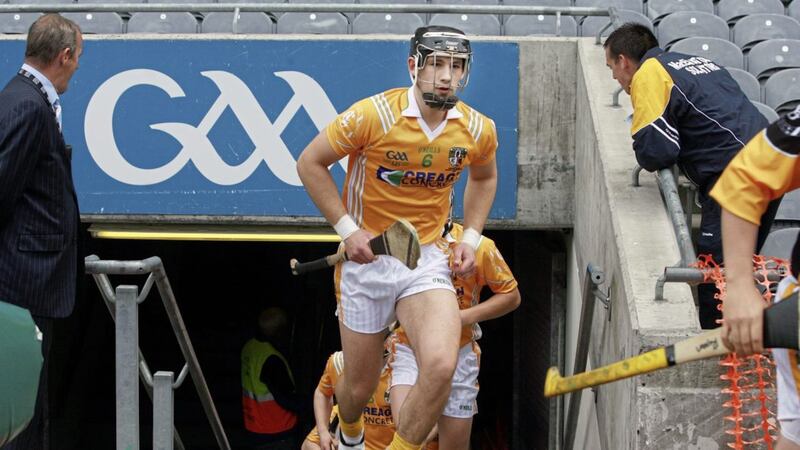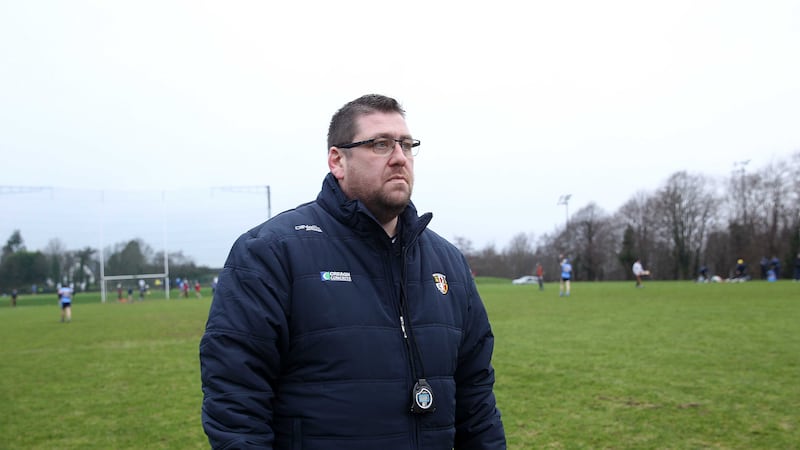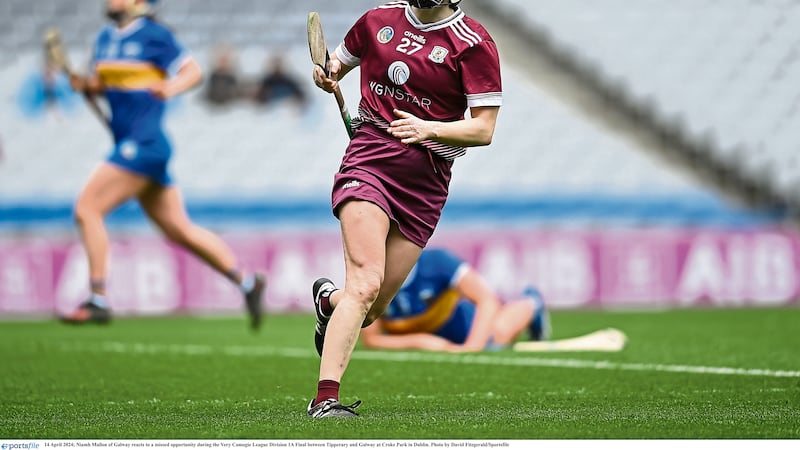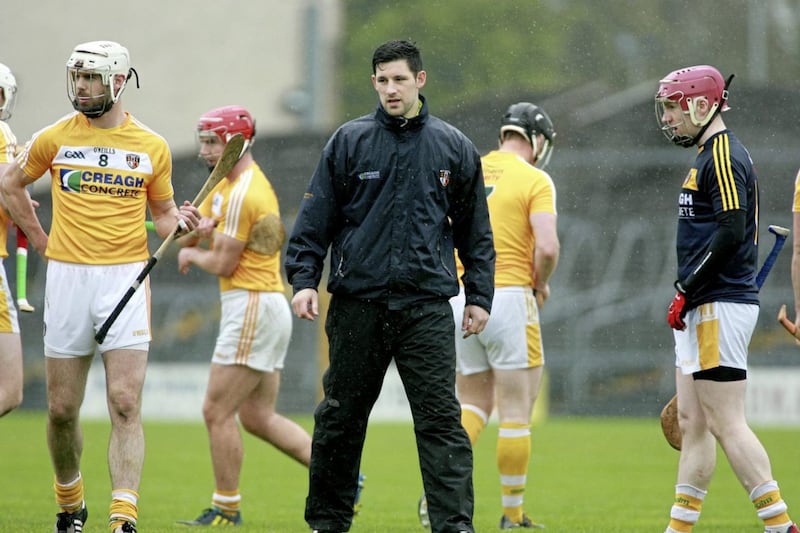A NEW year, another new manager and a new regime determined to breathe fresh oxygen into the lungs of Antrim hurling.
The Joe McDonagh Cup has promised much but delivered little, the hope offered by occasionally inspired performances masked by the festering sense of frustration that yo-yoing up and down divisions inevitably brings.
In Championship terms, their last proper, unforgettable day in the sun came 10 years ago this summer.
Anthony Daly’s Dubs were the unsuspecting victims.
The form lines coming into that qualifier clash offered little cause for optimism among the Saffron ranks.
Where Dublin had humbled Daly’s native Clare a week earlier, Antrim just squeaked past Carlow at Casement Park.
Yet Dinny Cahill’s men tore up the script to book an All-Ireland quarter-final showdown with Cork, scoring eight of the final nine points to stun Croke Park.
Karl Stewart was immense, Chrissy O’Connell denied Alan McCrabbe a first half goal at a crucial time and the marquee duo of Neil McManus and Liam Watson stood up when it mattered most.
But the cornerstone of that success was the 6’3 bull from Ballycastle wearing three on his back – 21-year-old Cormac Donnelly.
“The year before we played Dublin in Leinster [Dublin won by 10 points], I was centre-back and I got absolutely roped out; I’d a complete stinker, so I was determined that wouldn’t happen again.
“I was on ‘Dotsy’ O’Callaghan, he was flying against Clare the game before, so I was going in under a wee bit of pressure…”
O’Callaghan managed a solitary score before he was given the hook in the 54th minute, just as the Antrim charge was reaching full flow.
“We were defending the Hill 16 end in the second half and I mind the Armagh fans drifting in... they were there for Armagh-Dublin in the football after, but they rowed in behind us.
“It was all rosy in the garden when the Dubs were winning but when we started to bring it back the tone soon changed.
“It was a good oul laugh now, and we turned back and gave them a bit of a salute when the game was over.
“It was good times back then.”
Good times that, for him, came to an end far too soon.
Alongside the likes of McManus, Paul Shiels, Arron Graffin, Eddie McCloskey, Neal McAuley and Shane McNaughton, Donnelly was part of the minor teams that came through around the middle of the decade, offering hope for the next.
He was only 16 when the Saffrons pushed Limerick to the pin of their collars in the 2005 All-Ireland minor quarter-final, there the next year too as a Galway side containing Portumna wonderkid Joe Canning escaped Mullingar with a two-point last eight win.
The term ‘golden generation’ is bandied around far too readily but, in terms of emerging talent, this was as good as Antrim had in a while, or since.
“We started training in November time and, to be fair to ‘Sambo’ and ‘Woody’ and the county board, they had us down south every other weekend playing challenges; Wexford, Waterford, away on a Sunday playing Dublin.
“Then the James Stephen’s club down in Kilkenny ran a great minor tournament, teams across Ireland went to it, so even exposing ourselves to that sort of standard was great.
“The likes of ‘Shorty’, Shane McNaughton, Graffin, they all came at the one time and were just mad keen for hurling and mad keen to be competitive at that high level; we were competitive those days against Limerick and Galway, but we never really pushed on from that.”
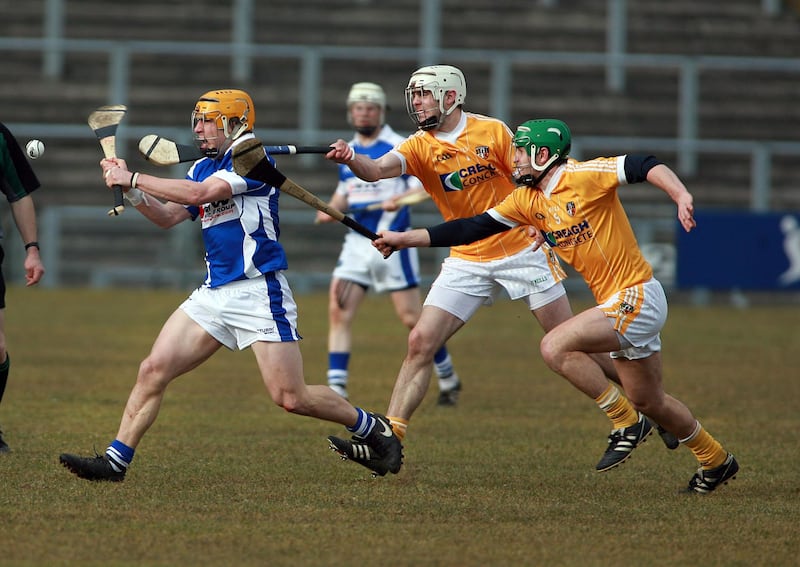
Now 31, McManus has been the one constant from that group in recent times.
McNaughton swapped the Glens for New York in 2016 to pursue an acting career. McCloskey and McAuley have stepped away in recent years.
Shiels is easily still good enough - his displays in Dunloy’s recent Antrim championship success proved that - but after being dogged by injury, he called time on the county in 2017.
Graffin hasn’t had it easy on that front either but is on the comeback trail once more.
Then there’s Cormac Donnelly.
“I’d a few wee groin operations before but then it was around the end of 2012, I had a back issue – sciatica, disc trouble - and I lost power down the left leg for the guts of a year.
“Coming back from that, I always had this niggly pain in my knee since then. You play on, you get by until it got to a stage where I couldn’t get by anymore.
“I don’t know whether I was doing more damage all along or whether it was a prolonged thing.”
Eventually though, there was no way back.
Still only 30, he isn’t sure when he last played for Antrim – “God I haven’t a clue, National League in 2012 or 2013” – but remembers well his final appearance in the black and amber stripes of the club.
“A championship game against Dunloy in 2014.
“Because of the bother I was having with the knee it was just play a match, recover, match, recover. I’d an absolute stinker that day, I was playing at centre-forward, marking Conor McKinley, and I said to myself ‘I have to make sure that doesn’t happen again’.
“That Monday or Tuesday I booked in for an MRI, and the whole thing proceeded that I needed a knee operation. They told me I’d be back running again in five or six months… I’ve never run since.''
He can say those words now, but it took a long time to accept the cold reality. The full spread of emotions came into play – denial, disappointment, bitterness and, eventually, acceptance, or some form of it.
The wounds are still raw, physically and mentally, and the hurt never truly goes away.
“The whole goal was always ‘I’m gonna get back, gonna get back’, but the knee didn’t knit properly. I had a microfracture in three areas of it and then the cartilage was supposed to grow upwards but never did so it was just bone on bone.
“Your whole life, all you wanted to do was hurl or win a championship, and the whole lot was taken away from you.
“I went and saw two or three other people and got different opinions, tried rehab, but it was only then when the wee boy came along I said enough is enough. I was out too much money seeing this one and that one, I had to jack it in.
“There were more important things in life.”
And where, prior to the operation, it was only when he bounded out onto the field that the knee would niggle at him, now it is 24/7.
Whether walking out to the car or playing in the back garden with four-year-old son Iarla, it’s always there.
“It’s at me all the time. I need a knee replacement but I’m obviously too young for that, so it’s just about managing it as best I can.
“I don’t think I’ll ever get over it as such. The more I think about it the more it eats up at me; you just have to drop it out because if you were doing that you’d be torturing yourself steady.
“I just try to put it to the back of my mind and move on. That’s all you can do.”
**********************
AS they reached the bottom of another pint, Cormac Donnelly still wasn’t buying what Michael McShane was selling.
Not that he didn’t appreciate the invitation, but the buzz was matched every step by the doubts swirling around his head.
This was Christmas 2015, and fellow Ballycastle man McShane was over Derry champions Slaughtneil.
Under Mickey Glover they had won back-to-back county titles in 2013 and 2014, McShane helping complete the hat-trick.
But breaking Ulster was another matter.
McShane felt his club-mate had something to offer in their bid to achieve that goal. Donnelly wasn’t so sure.
“I’d done a wee bit with the U14s one year, then I gave Stephen McBride a hand with the Ballycastle camogs and before you knew it you were in the thick of it, full throttle.
“When Michael asked me would I be interested in working with Slaughtneil it was something that excited me, but at the same time I was very sceptical about it because I was so raw and so inexperienced. I still am very inexperienced.
“I didn’t know what I had to offer, and then the calibre of player Slaughtneil have, was I going to be up to scratch with what they were demanding? Was I going to be up to scratch for Michael?
“I took the growth mindset and went in there, jumped into it, but I’ll never forget going up for the first training session. I was a nervous wreck.
“From the off the boys were just mad keen to learn, mad keen for hurling and they made it all the easier.”
The left knee that had brought an abrupt end to his playing days would be sore coming off the training field, but he quickly realised this was the next best thing he could do. And what a place to do it.
“They’re an amazing club. The whole community, the families, they do everything just to make sure Slaughtneil’s winning and that’s what I love about them.
“They just have that winning mentality, and the players you’re involved with will do everything in their power to make sure they continue winning. It’s hard to beat that.”
And so unfolded an unforgettable journey that saw the Emmett’s reach the promised land, finally getting their hands on the Four Seasons Cup in McShane’s second year before repeating the dose 12 months later.
With the club’s footballers also enjoying a period of unprecedented success, continually serving two masters through the winter was sure to take its toll eventually.
The levee broke at Corrigan Park in November 2018 when Slaughtneil were blown away by unfancied Ballycran. McShane pondered his own future long and hard before opting to stay on.
It is a decision that has benefitted all parties and on Sunday, two months after ascending back to the Ulster throne, they face star-studded Kilkenny kingpins Ballyhale Shamrocks in the All-Ireland semi-final.
Donnelly will be in the stands at Pairc Esler rather than the sideline tomorrow, the soul-searching that followed the Ballycran defeat leading him to the same conclusion no matter how many times it was revisited.
“I always look at it from a players’ point of view; I just felt maybe things were going stale a wee bit. I was there for three years, I gave everything I had, maybe taking a training session then up into the gym working with certain players rehabbing… I just didn’t think I could give anything else and I had other commitments that were going to be coming on down the line.
“I realised if we were to go again I would’ve needed to raise the bar and commitments outside of Slaughtneil weren’t going to allow me to do that.
“If I had’ve gone again, it would’ve been the same voice again, would the impact have been there with the players? I’m not so sure...
“But it shows you the manager Michael is that he’s turned it around again, freshened the whole thing up, and the players got that break for the winter and here they are now.”
The footballers’ exit to neighbours Glen at the semi-final stage in Derry took time to digest, but has allowed the Slaughtneil hurlers to focus solely on the job at hand.
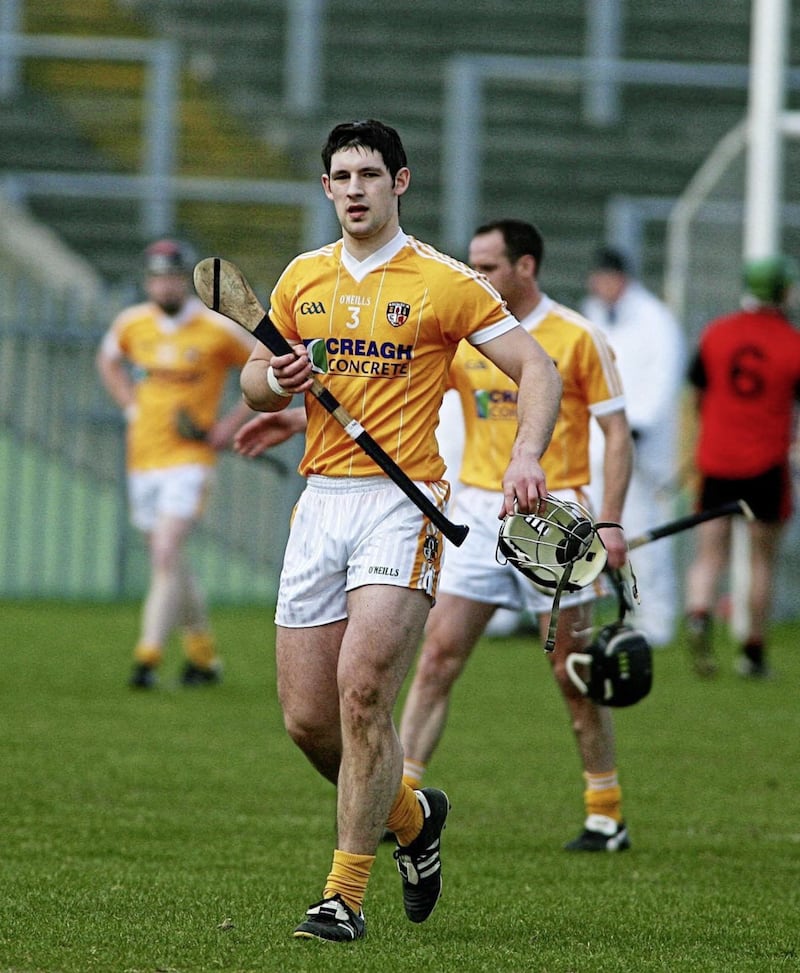
And even though they start as huge underdogs, Donnelly believes they are capable of grasping this latest opportunity with both hands.
“Of course this is the best chance they’ve had, absolutely.
“The players played in two All-Ireland hurling semi-finals when they also had a football semi-final… it’s tough. Knowing the players, they’re probably going now ‘let’s see how far we can go here, we have the chance to concentrate on one code’. They won’t fear Ballyhale.
“As a we'an in the back garden, I’m sure when those boys were running about they were imagining themselves playing against the best.
“Now they’re coming up against boys like TJ Reid, Colin Fennelly; they’ve nothing to lose. That’s where you want to be playing, that’s who you want to be competing against.”
What he wouldn’t give to be in their boots.
Instead, though, Donnelly’s focus is on the future and life after hurling, as tough as that is to take.
He finishes up a degree in sports coaching and performance at Ulster University in May, and is unlikely to be far from the field for too long.
But there’s no pressure, no time-frame. He has lived under the shadows of other peoples’ deadlines in the past and had the rug pulled from under him.
Now, whatever he decides, it will be on his terms.
“I just take it day by day now.
“I lost my mother there a while back so, what the future holds, I don’t know. I’ve a passion for hurling, a passion for coaching and getting the best out of people.
“I’ll just see where that takes me and what pops up.”
